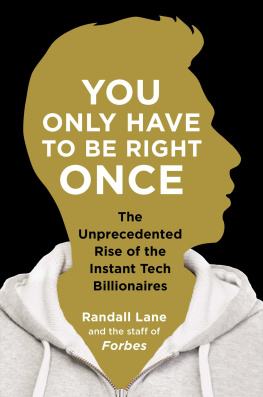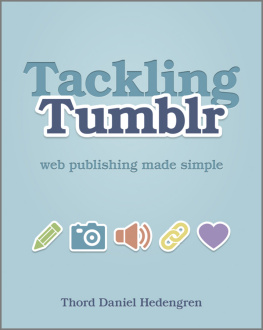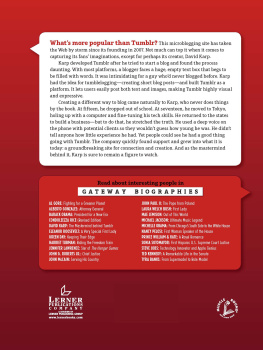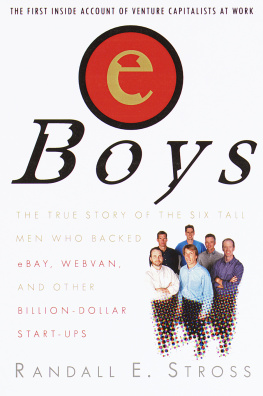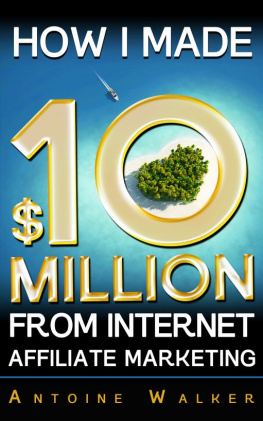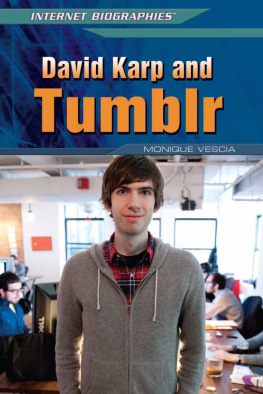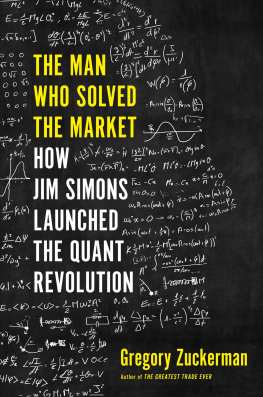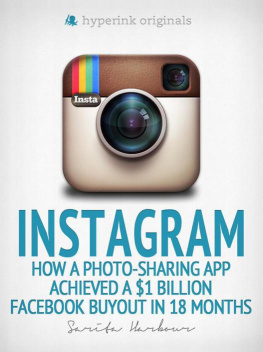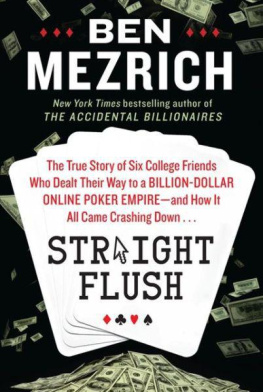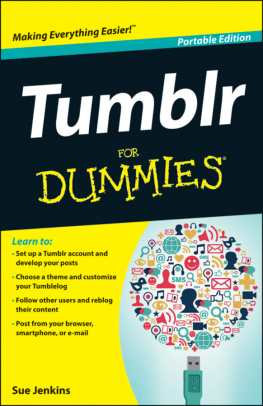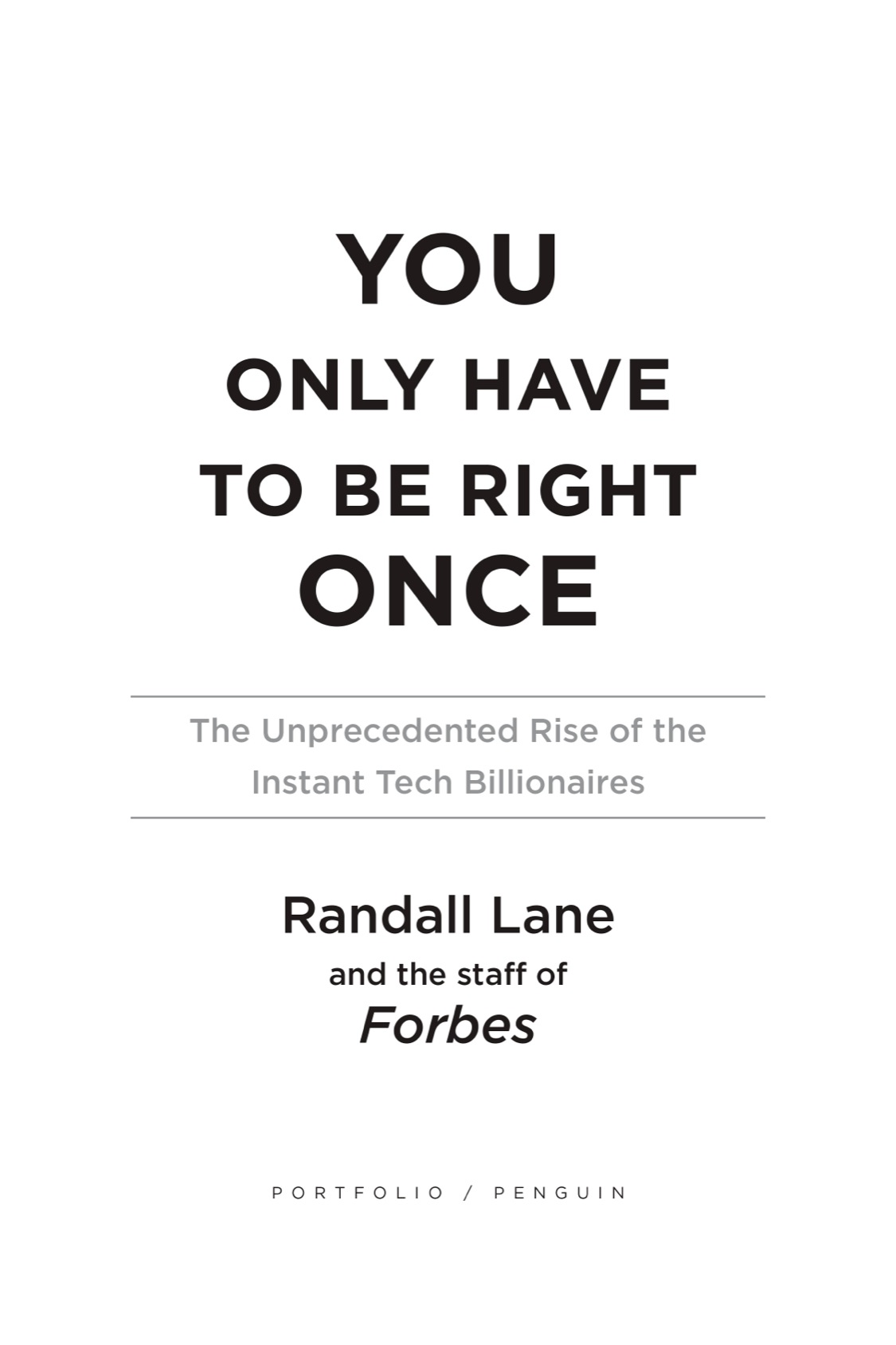PORTFOLIO / PENGUIN
Published by the Penguin Group
Penguin Group (USA) LLC
375 Hudson Street
New York, New York 10014`

USA | Canada | UK | Ireland | Australia | New Zealand | India | South Africa | China
penguin.com
A Penguin Random House Company
First published by Portfolio / Penguin, a member of Penguin Group (USA) LLC, 2014
Copyright 2014 by Forbes Media LLC
Penguin supports copyright. Copyright fuels creativity, encourages diverse voices, promotes free speech, and creates a vibrant culture. Thank you for buying an authorized edition of this book and for complying with copyright laws by not reproducing, scanning, or distributing any part of it in any form without permission. You are supporting writers and allowing Penguin to continue to publish books for every reader.
Most of the selections in this book have appeared in issues of Forbes magazine.
Photograph credits
: Forbes Media LLC
: Elon Musk by Kristoffer Tripplaar / Alamy
: Christian Peacock
: Michele Clement
: Walter Smith
: Eric Millette
: Don Feria / Getty Images
: MGPI / MichaelGrecco.com
: Ethan Pines / Copyright 2014 Ethan Pines
: Jamel Toppin
: Gabriela Hasbun
ISBN 978-0-698-18568-5
Version_1
Introduction
W edged into a corner, Sean Parker sported the removed look of someone at a crowded party where they dont know many people. Which, at a media soiree at New Yorks clubby Monkey Bar on October 4, 2011, happened to be the case. Given that two weeks prior, Parker became the first person to adorn the cover of Forbes magazine since I returned as the editor, it seemed right to introduce myself.
I know exactly who you are, Parker responded, quickly parrying with a short history of my personal background, Forbess position in the marketplace, and my stated goals for the magazine. He then explained his (typical) obsessiveness with a soliloquy that can be summed up in two words: Thank you.
Its not that the Forbes cover had been a valentine: It revealed the polymath who had helped shape Napster, Facebook, and Spotify with all his quirks and faults. But until that storyviewed more than 700,000 times online and by millions more who saw the print magazine versionthe world equated him with the villainous character portrayed by Justin Timberlake in David Finchers movie The Social Network. Even Mark Zuckerberg conceded the movie did Parker factual injustice. Reduced to an evil-businessman caricature, Parker had barricaded himself in LAs Peninsula Hotel for two months, where hed gained thirty pounds.
His twenty-two-year-old fiance had helped him ditch the depression, and the weight. And so Parker stood before me, himself again, as a brash actor in a story that has only a little to do with Facebook and feels one hundred times bigger: how a handful of young digital swashbucklers shrugged off the Great Recession to transform how industries operate and fortunes get made.
The day after my conversation with Parker, Steve Jobs passed away. Jobs had epitomized the old new guard, one of a trinity of tech entrepreneurswith Bill Gates and Michael Dellwho two generations earlier, while themselves in their twenties, proved the disruptive power of technology. Now Jobs was dead. Gates had become a full-time philanthropist. And Dells company, as with Apple and Microsoft, was viewed by this new generation as the bloated prey rather than the hungry predator.
This narrative isnt new. The first half century of the American computer age has seen perennial waves of the young taking on the old. During my first go-around at Forbes, just out of college in the early nineties, I chronicled tech-savvy Generation X, which valued entrepreneurship over the corporate ladder and fueled the original dotcom boom and bust, carving out a handful of huge winners, notably Google and eBay, in the process.
In this round, however, the underlying drivers have accelerated exponentially. This new model of Young Turk isnt merely comfortable with technologyhe cant remember a world without the Internet. Accordingly, hes no longer content merely conquering the technology spaceevery industry is now the technology space, whether hotels or music or transportation. And thus ripe for pillaging.
Then theres the cash. History will determine whether this proves to be yet another financial bubblewhen a five-year-old taxi-sharing app, Uber, raises venture money at a $17 billion valuation, its hard to bet against that. But whats undeniable is that were witnessing the most prodigious wealth machine in human history. Zuckerberg, worth some $30 billion on his thirtieth birthday, may be the poster boy for this new breed, but hes far from an outlier. Almost a dozen Americans, ineligible by dint of age to serve as president, became self-made billionaires over the past five years. Whats more, no one in this cohort finds that particularly unusualthey pretty much feel entitled to it.
Youth, meanwhile, has officially ceased to be a disadvantage, upending pretty much the entirety of civilized history. Previously, whether you were a blacksmith or a lawyer, wisdom and experience rendered you more valuable as years went on. No longer. For the past twenty years, if your computer broke, youd prefer that the twenty-five-year-old fix it rather than the fifty-five-year-old. For ten years, venture capitalists favored young digital natives over industry veterans, as long as the former got paired with an operational adult. Weve now skipped the adult requirement. The kids are fully running the show.
And unlike the hedge fund managers of the previous decade, who were rightly perceived to have conjured their billions without actually creating anything (other than the complicated financial structures that wound up collapsing everything else), no one resents them for it. Quite the contrary, they glide across the country in their chartered Gulfstreams like folk heroes.
The white hats stem from the perception of meritocracy. The high stakes put a premium on ideas and technical execution, rather than connections and salesmanship. As you turn the pages of this book, theres a far higher correlation between financial success and a stint as a teen hacker than having daddys name on a building at Harvard. The engineers have trumped the salesmen. Sexism remains embedded in the coder-boy set (its not by choice that this book is chock-a-block with guys; very few women have launched major tech-enabled start-ups). But just ask Jan Koum or Pejman Nozad or Daniel Ekthe American Dream has never been more vivid. The only nepotism, as best as I can tell, comes from being the catalysts roommate, buddy, or frat brother. (In the 2010s, theres no sweeter title than co-founder.) Its hard to resent someone when you had the same shot at the brass ring.
To me, however, the ultimate commonality across all these chapters, the one that lets them reap adulation, boils down to individualism. The post-meltdown recovery has proven among the most tepid in national history, especially the job market. Where others see a paralysis-inducing world, these guys see a gold rush, and they take action. Theyd all rather regret the things they did than what they didnt do. Jobs and Gates and Dell made dropping out acceptable; among this group, its cool, a badge of honor. (Snapchats Evan Spiegel dropped out of Stanford in the middle of a class, a month before graduation... on principle.)

